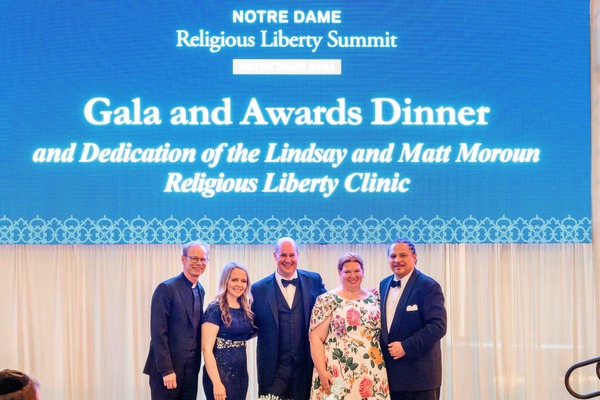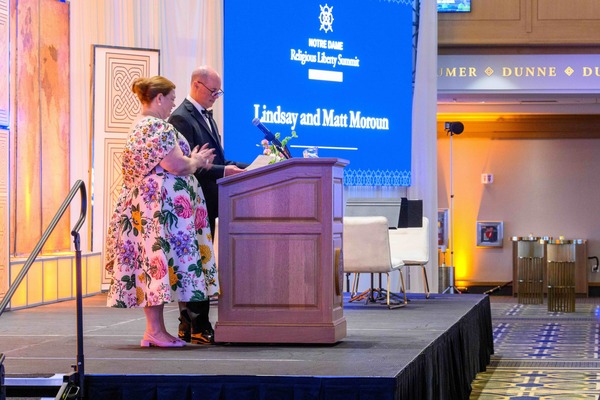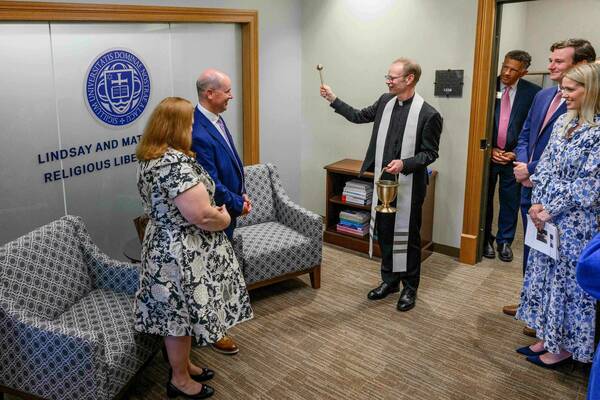Notre Dame Law School clinic to be named the Lindsay and Matt Moroun Religious Liberty Clinic

Notre Dame Law School announced July 10 that its Religious Liberty Clinic will now be named the Lindsay and Matt Moroun Religious Liberty Clinic. The announcement was made during the fourth annual Notre Dame Religious Liberty Summit, which brings together the world’s leading defenders of religious liberty for conversation among clergy, scholars, politicians and advocates.
Notre Dame Law School’s Religious Liberty Clinic was established in 2020 upon a foundational gift from Matt and Lindsay Moroun. Less than five years after its inception, the clinic became one of the largest academic institutions in the world dedicated to promoting and defending religious freedom. The clinic has represented individuals and organizations from diverse faith traditions, with a mission to protect the constitutional right to believe and practice religion freely.
“Without the courage and confidence of Lindsay and Matt Moroun to lead the conversation regarding religious freedom, we could not have come together to begin and continue this important work,” said G. Marcus Cole, the Joseph A. Matson Dean of Notre Dame Law School and founder of the Notre Dame Law School Religious Liberty Initiative. “The Moroun family’s ability to see the vision of what is possible, with faith as the activating principle, is the cornerstone of all that we have accomplished, and we are deeply grateful to them.”
The Moroun family’s generosity ensures that this rich tradition of scholarship and practice can continue. Matt and Lindsay Moroun are passionate about the fight for religious freedom. They believe that Notre Dame Law School is the best place to champion religious freedom across the globe.

“As a Catholic university, Notre Dame has from its founding proven that faith is not only compatible with a free society and the open pursuit of truth, it is necessary to their fulfillment,” said Lindsay and Matt Moroun. “That is why Notre Dame Law School is the ideal home for an initiative that prepares its students to be fearless defenders of every person’s God-given right to live their lives according to their beliefs. We are thrilled to support this mission, and to ensure that it can continue as long as necessary.”
Under the guidance of Law School faculty and staff, student fellows at the clinic work on a variety of legal matters to promote religious freedom, domestically and globally. For example, over the past three years, the clinic has filed numerous briefs and argued before a federal appellate court in support of the Apache people in Apache Stronghold v. United States, a case seeking to protect their sacred land and religious traditions.
In other cases, Notre Dame students have represented U.S. immigrants seeking asylum from religious persecution, advocated for religious ministries’ freedom to serve communities in need, worked alongside government officials to advance religious freedom issues in Nepal and fought to protect religious exercise in prisons.

“The students, faculty and staff in the Religious Liberty Clinic have made incredible strides for religious freedom in the last four years,” said John Meiser, director of the Lindsay and Matt Moroun Religious Liberty Clinic. “I am deeply grateful to the Moroun family, whose generosity has enabled us to give our students unparalleled opportunities to serve people in need and to participate in this critical work to protect our most foundational freedom.”
In addition to their commitment to the Law School, Lindsay and Matt Moroun serve on the Campaign Cabinet, devoting their time to be of service to the University in furtherance of the strategic framework and University priorities during the For Good Initiative. In conjunction with their profound Catholic faith, the Morouns are devoted to their hometown of Detroit and its revitalization, making an impact through business practices that improve the lives of locals as well as unassuming, quiet acts of philanthropy.
Originally published by at law.nd.edu on July 12.
Latest Colleges & Schools
- Prioritizing prenatal care may decrease low birth weight outcomes in The Gambia, Notre Dame research findsA new study co-authored by University of Notre Dame researchers highlights the importance of prenatal care for improving the health of mothers and newborns, providing evidence that can inform policy.
- Partial peace deals may facilitate comprehensive accords, offering roadmap for policymakers, practitionersPartial peace agreements — deals that address targeted issues on the way to larger comprehensive accords — could provide a blueprint for peacebuilding policymakers and practitioners, according to new University of Notre Dame research.
- Notre Dame Law School launches new Veterans Law ClinicNotre Dame Law School is launching a new Veterans Law Clinic, dedicated to providing free legal assistance to U.S. military veterans in matters such as disability claims and appeals.
- City of Gary and Notre Dame’s Housing and Community Regeneration Initiative announce vision and action plan for downtown GaryThe City of Gary and the University of Notre Dame School of Architecture’s Housing and Community Regeneration Initiative announced a “Vision and Action Plan” for downtown Gary during a news conference Tuesday (May 27). The final report serves as a roadmap for Gary’s leadership to follow to reestablish the city’s building culture.
- Notre Dame Executive MBA offers scholarships to area leadersMichiana Forty under 40 honorees can receive $30,000 toward tuition for the Notre Dame EMBA program.
- Kenneth Scheve appointed dean of the University of Notre Dame’s College of Arts and LettersKenneth Scheve, the Dean Acheson Professor of Political Science and Global Affairs and the dean of social science at Yale University, has been appointed the I.A. O’Shaughnessy Dean of the College of Arts and Letters by University of Notre Dame President Rev. Robert A. Dowd, C.S.C. Scheve, who will also hold a tenured faculty position in the Department of Political Science, begins a five-year term as dean on July 1.













